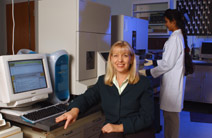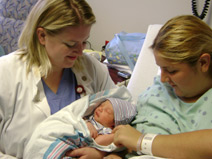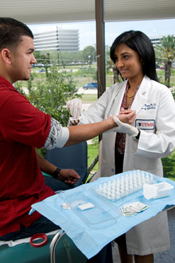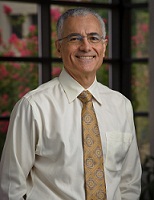Texas
Center for Clinical and Translational Sciences
Houston, Texas
Principal Investigators
David Dugald McPherson, M.D., University of Texas Health Science Center at Houston
Robert C. Bast, Jr., M.D., University of Texas Health Science Center at Houston
Daniel D. Karp, M.D., University of Texas Health Science Center at Houston
Roberta B. Ness, M.D., M.P.H., University of Texas Health Science Center at Houston

Dianna Milewicz, M.D., Ph.D., professor and director of medical genetics at The University of Texas Medical School at Houston, directs research in the Genetics Core Lab. The lab will help facilitate more rapid research results at UT-Houston's Center for Clinical and Translations Sciences. (UT Health Science Center at Houston Photo/Ester Fant)
The University of Texas Health Science Center at Houston (UTHSC-H) has established a Center for Clinical and Translational Sciences (CCTS) at the Texas Medical Center (TMC) in Houston. Participating faculty and trainees in CCTS include those from the UTHSC-H component degree-granting schools, including its Medical School, School of Public Health, Graduate School of Biomedical Sciences, School of Health Information Sciences, School of Nursing, Dental Branch, and Brown Foundation Institute of Molecular Medicine, as well as collaborating faculty/facilities of The University of Texas M.D. Anderson Cancer Center (MDACC), which also is located in the TMC. The academic home for CCTS is housed in 11,422 square feet of recently renovated space at the UT Medical School, which is physically joined to Memorial Hermann-Texas Medical Center and serves as its partner and primary teaching hospital. The CCTS home administers all aspects of CCTS and provides space and resources for faculty and trainees, along with expertise in study design, biostatistics, regulatory issues, ethics, bioinformatics, funding of pilot and feasibility studies, provision of resources, protected time for clinical and translational faculty and trainees, and interactions/collaborations with the various communities and industry. For participant and clinical interactions resources, CCTS has subsumed the UTHSC-H General Clinical Research Center (GCRC) at Memorial Hermann, the satellite UTHSC-H GCRC at Brownsville, Texas, and, in part, the MDACC Clinical and Translational Research Center, to enhance research productivity and efficiency. In its educational component, CCTS has subsumed, in part, the current Center for Clinical Research and Evidence-Based Medicine, which has developed and currently provides formal classes, mentoring, and a Master of Clinical Research degree at UTHSC-H, and an active K30 award at MDACC. Also proposed in the original application was a novel T32 application offering combinations of master's and doctoral degrees in community health sciences, biomedical sciences and/or biomedical informatics — primarily for pre-doctoral students — and a K12 application for post-doctoral trainees and junior faculty. CCTS also has subsumed core translational laboratories, including a genotyping/sequencing core; a biomarkers core offering DNA microarray, RT-PCR and proteomics services; an immune monitoring core; an MRI core; and a biobanking core. A CCTS think tank composed of highly accomplished translational and clinical investigators, basic scientists and educators, and community representatives has come together as an engine for innovation to bring forward and recommend the application of novel and emerging scientific information, methods and technologies to research into human health and diseases across specialties, disciplines and communities.
Institute for Integration of Medicine and Science
San Antonio, Texas
Principal Investigator
Robert A. Clark, M.D., University of Texas Health Science Center at San Antonio

A medical student at The University of Texas Health Science Center at San Antonio celebrates new life with a mother and baby while on obstetrics rotation at the Regional Academic Health Center, a campus of the Health Science Center in the Lower Rio Grande Valley of Texas. (UT Health Science Center at San Antonio Photo)
The University of Texas Health Science Center at San Antonio has established the Institute for Integration of Medicine and Science as the home for the Clinical and Translational Science Award. The institute's mission is to spur integration of clinical and translational research, education, training and career development across all schools and among partner organizations in South Texas. The institute will bring existing and newly developing resources and intellectual capital to bear on clinical and translational research for the improvement of human health. Meaningful two-way community participation has promoted buy-in from all stakeholders and will remain a key principle.
Institute partners have brought together major talent and a broad array of resources to create synergies that add value to all participating organizations, residents of the region and the CTSA network. Distinctive features of the institute include thriving partnerships with key public and private organizations, major investments in research resources and infrastructure, one of the world's largest primate research colonies, the largest cadre of military health care and biomedical research operations in the United States, and a 46,000-square-mile service area populated by predominantly Hispanic residents. This area includes some of the country's poorest people and has high rates of health disparities, providing an opportunity, challenge and obligation for this institute to make a significant impact on human health.
The primary vision is to work closely with all partners to translate the results of the academic- and community-based research for the direct benefit of the regional population.
Institute for Translational Sciences at UTMB
Galveston, Texas
Principal Investigator
Allan R. Brasier, M.D., University of Texas Medical Branch

UTMB physician Meera Gupta's translational research interests include transplant immunology, particularly the mechanisms of graft tolerance and rejection. She also has clinical interests in solid organ transplantation and cystic fibrosis. UTMB's Institute for Translational Sciences is composed of eight multidisciplinary teams formed around a diversity of topics. (UTMB Photo/John Glowczwski)
The University of Texas Medical Branch (UTMB) at Galveston, through its Clinical and Translational Science Award (CTSA), seeks to facilitate translational research as a rigorous discipline, develop translational research training programs at all levels in the graduate continuum, effectively conduct and bridge step one translational research to steps two and three, and interface productively with the national CTSA consortium. In particular, this CTSA helps UTMB to build teams of researchers with diverse skills who can work effectively toward positive health outcomes. These teams also serve as exemplary learning environments for the next generation of translational investigators. Training activities include a Clinical and Translational Scholars program, an Academy of Mentors, a seminar series and team training workshops.
The CTSA is administered by UTMB's Institute for Translational Sciences (ITS), which facilitates many aspects of translational research and support at the university, enhancing researchers' ability to quickly and effectively translate basic science discoveries into improvements in human health. ITS' operations are guided by three overlying principles: 1) proactively identifying new team-oriented research opportunities; 2) prioritizing trainee involvement in a team-based culture; and 3) integrating systems biological approaches into translational research. Through the CTSA, ITS has organized 12 key resources — combinations of university core laboratories and intellectual resources, integrated by a single point of investigator/trainee contact. Key resources are designed to respond to the needs of investigators and trainees and to break down communication, technology and regulatory barriers, thereby transforming how UTMB conducts patient-oriented research.
UT Southwestern Clinical and Translational Alliance for Research
Dallas, Texas
Principal Investigator
Robert D. Toto, M.D., University of Texas Southwestern Medical Center at Dallas

Dr. Robert Toto, associate dean for clinical and translational research at UT Southwestern Medical Center, is principal investigator for UT-STAR. (UT Southwestern Medical Center Photo)
The University of Texas (UT) Southwestern Medical Center has established the UT Southwestern Clinical and Translational Alliance for Research (UT-STAR) supported by an NIH-sponsored Clinical and Translational Science Award. UT-STAR provides the crucial infrastructure necessary for medical scientists to discover and apply new diagnostics and therapeutics for the detection, diagnosis, treatment and prevention of disease. We focus on four major areas: 1) catalyzing research that leverages our strengths in biological sciences, 2) educating clinical investigators to perform cutting-edge clinical and translational research, 3) developing and implementing new research methods and technologies, and 4) engaging the community in improving the health of the population that we serve.
The Department of Clinical Sciences serves as the academic home for UT-STAR and is supported by faculty from UT Southwestern’s schools of allopathic and osteopathic medicine as well as from our partnering institutions’ schools of dentistry, nursing, pharmacy, public health, bioengineering and computer science. Overall, UT-STAR includes more than 200 established clinical and translational investigators, who act as faculty and mentors.
Existing infrastructure includes our Clinical and Translational Research Center, which has incorporated the Dallas Heart Study infrastructure and database, creating new blood and tissue biobanks; education programs for Clinical Research Scholars and M.Sc. degree candidates that include an innovative T1/Phase I trials training track and expanded instruction in comparative-effectiveness research and community engagement research; a Spanish-language validation service; T1 research funding pilot awards to develop novel translational diagnostics and therapeutics; an Advanced Imaging Research Center for T1 research; a large and medically diverse patient base; and the use of more than 85,000 square feet of space.
With the help of the CTSA and a strong institutional commitment, UT-STAR reduces many barriers to performing clinical and translational research through education, collaboration, research resource expansion, integration and improved health care delivery to our community and region.
Social Media Links